
Hank Williams, Jr., son of the haloed honkytonk hero, Hank Williams, is often seen as an also-ran or a lesser light in the firmaments of the country pantheon. In part this is due to the difficulty living up to his famous father's double-edged reputation, as both an immortal hillbilly poet and as one of the great, tragic live-fast/die-young figures in show business history. Hank, Jr. has never been able to summon anything near his father's raw talent and bare-bones soulfulness, and his self-mythologizing party animal antics have led to a public image as a loudmouthed redneck buffoon. Still, H2 has proved himself an artist capable of striking depth and surprising longevity. While he may have pandered to a good-ole-boy caricature, he has written or performed several of the best hard country songs of the late 20th Century; his output is wildly inconsistent, but certainly worth checking out. Here's a quick look at some of his stuff...
Born in 1949, Randall Hank Williams was scarcely three years old when his fabled father died in New Year's Day, 1953. Over the years Hank, Sr. cast a long shadow over his son's life, as evidenced in a near-endless string of self-referential songs in which Hank, Jr. namechecks his own father and compares their lives, careers and carousing. His son, Hank Williams III began recording in the 1990s and has also kept the rebel torch burning...
CD Best-Ofs
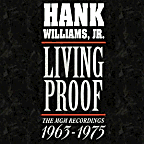 Hank Williams, Jr. "Living Proof -- The MGM Recordings: 1963-1975" (Polygram Records, 1994)
Hank Williams, Jr. "Living Proof -- The MGM Recordings: 1963-1975" (Polygram Records, 1994)
Junior's recording career started in 1963, when he was only fourteen years old. Thanks to the aggressive machinations of his mother, Hank Sr.'s widow, Audrey Williams, the lad landed a contract with MGM Records. He immediately scored a Top 5 hit with a much-hyped cover of an old Hank, Sr. song, "Long Gone Lonesome Blues," followed up in '66 with the self-penned "Standing In The Shadows," a biographical tune that both milked the Hank Williams legend, and sought to diffuse potential criticism that the boy was just a pale imitation of his tortured, brilliant father. This 3-CD set charts the course of Jr.'s somewhat iffy track record in the years he was on the ailing MGM label, where he recorded prolifically and released over two dozen albums in half as many years. Generally speaking, country collectors don't prize these LPs very highly -- the quality was mixed at best, and while Williams was an adequate performer, he was seen as more of a workhorse, rather than someone who could reach in and touch your soul, the way the best country singers do. Still, this box set has a surprising resonance to it -- the opening tracks sound as remarkable now as they did in the mid-'60s: surely, any kid who sang that well at fourteen had an amazing career ahead of him. But the by-the-numbers arrangements that plagued Nashville at the time, coupled with MGM's second-rate status, ensured that Williams's artistic growth would be stunted for years to come. There are moments of emotional power, but they seem almost incidental, and the continual references to Hank, Sr. -- either through cover songs or tribute tunes -- wear thin quick. Along with numerous album tracks and singles (some of which dented the charts, others which fell like stones), this collection also includes nearly two dozen previously unreleased songs, including many covers of older, non-Hank songs from the 1940s and '50s, and also gathers some interesting Charlie Rich-ish R&B songs that Williams released on the Verve label, under the pseudonym "Bocephus," for fear that putting them out under his own name would cripple his career in Nashville. The third disc reissues almost in its entirety the 1975 album, Hank Williams, Jr... And Friends, which was the last album he made for MGM before the label folded in '76, and which many consider his best work for the label, the capstone of a frustrating early career. While most of the material on here is far from electrifying, it's still a very listenable collection, worth tracking down and hanging onto, as it stands on its own musically, and also offers a well-balanced glimpse into a career that is often porly understood and little appreciated. Includes excellent liner notes by music writer Colin Escott.
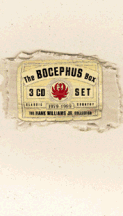 Hank Williams, Jr. "The Bocephus Box: 1979-1992" (Curb Records, 1992)
Hank Williams, Jr. "The Bocephus Box: 1979-1992" (Curb Records, 1992)
A masterful document of Jr.'s prime hitmaking years, from brilliant peaks such as "I Just Ain't Been Able" and "Family Tradition" to more strained material such as his later political tunes and various remakes of "All My Rowdy Friends." I think it's safe to say that somewhere in the '80s (certainly in the '90s) that Hank Jr. kinda lost his edge -- and the more he threw himself into his rowdy, redneck persona, the further he got from his true country muse. Still, the "early" stuff on here reminds us of the finely crafted soulfulness he was able to muster during his mid-to-late '70s peak, and scattered tracks in the years that followed also manage to play to his strengths. This 3-CD best-of, with live tracks, his gratuitous, dramatic proclamations of drunkenness and Southern rock covers of old ZZ Top and Aerosmith songs, is probably way to much Hank, Jr. for the average listener to wade through, but it does give a very good, complete picture of Jr.'s decades-long creative arc. And there is definitely a strong case to be made that owning a best-of might be more rewarding than wading through his original albums in search of worthy material...
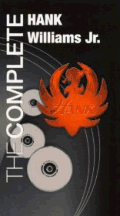 Hank Williams, Jr. "The Complete Hank Williams, Jr." (Curb Records, 1999)
Hank Williams, Jr. "The Complete Hank Williams, Jr." (Curb Records, 1999)
A 4-CD set that covers a lot of the same terrain as The Bocephus Box, this is actually a little harder to track down. If you find it, though, it's equally worth picking up.
 Hank Williams, Jr. "The Bocephus Box" (Curb Records, 2000)
Hank Williams, Jr. "The Bocephus Box" (Curb Records, 2000)
They also did a re-do of the 3-CD Bocephus Box, with a slightly different track listing, and new liner notes by H2 himself.
Discography - Albums
Hank Williams, Jr. "...Sings The Songs Of Hank Williams" (MGM Records, 1964) (LP)
Hank Williams, Jr. "Hank Williams' Life Story: Your Cheatin' Heart" (MGM Records, 1964) (LP)
Hank Williams, Jr. & Connie Francis "Sing Great Country" (MGM Records, 1964) (LP)
Hank Williams, Jr. "Father And Son" (MGM Records, 1965) (LP)
Hank Williams, Jr. "Ballads Of The Hills And Plains" (MGM Records, 1965) (LP)
Hank Williams, Jr. "Blues My Name" (MGM Records, 1966) (LP)
Hank Williams, Jr. "Father And Son Again" (MGM Records, 1966) (LP)
Hank Williams, Jr. "Country Shadows" (MGM Records, 1966) (LP)
Hank Williams, Jr. "My Own Way" (MGM Records, 1967) (LP)
Hank Williams, Jr. "The Best Of Hank Williams, Jr" (MGM Records, 1967) (LP)
Hank Williams, Jr. "My Songs" (MGM Records, 1967) (LP)
Hank Williams, Jr. "A Time To Sing" (MGM Records, 1968) (LP)
Hank Williams, Jr. "My Songs" (MGM Records, 1967) (LP)
Hank Williams, Jr. "Songs My Father Left Me" (MGM Records, 1969) (LP)
Hank Williams, Jr. "Luke The Drifter, Jr, v.2" (MGM Records, 1969) (LP)
Hank Williams, Jr. "Live At Cobo Hall" (MGM Records, 1969) (LP)
Hank Williams, Jr. "Greatest Hits" (MGM Records, 1969) (LP)
Hank Williams, Jr. "Sunday Morning" (MGM Records, 1969) (LP)
Hank Williams, Jr. "Luke The Drifter, Jr." (MGM Records, 1970) (LP)
Hank Williams, Jr. "Singing My Songs" (MGM Records, 1970) (LP)
Hank Williams, Jr. "Hank Williams, Jr." (MGM Records, 1970) (LP)
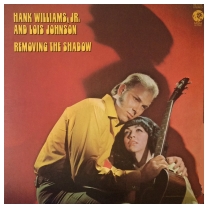 Hank Williams, Jr. & Lois Johnson "Removing The Shadow" (MGM Records, 1970) (LP)
Hank Williams, Jr. & Lois Johnson "Removing The Shadow" (MGM Records, 1970) (LP)
(Produced by Jim Vienneau)
Although she started recording singles as far back as 1965 (with Billy Sherrill, no less!) Lois Johnson's earliest albums were in a duo with the pre-outlaw Hank, Jr. They had a couple of moderate hits, including the title track and a sweet cover of the Everly Brothers oldie, "So Sad (To Watch Good Love Go Bad)," which was the duo's highest charting single. Johnson hasn't yet developed a distinctive style -- she's basically singing in a Loretta Lynn mode -- but she sounds nice, and brings out good, down-to-earth performances by Williams, and they split the songs up pretty evenly, without her getting overshadowed by the more established star. This is a pretty good record -- nothing dazzling or original, but it's a good listen. And of course, it being a Hank, Jr. album, there are several Hank Williams covers, including a lively "Why Don't You Love Me," as well as "Settin' The Woods On Fire," and others, and a drippy cover of "If I Were A Carpenter," which I guess was a nod at Johnny & June. Hank Jr. gets songwriter credit on the title track, "Removing The Shadow" and there are two original songs by a guy called Kent Westberry, "Party People" and "What We Used To Hang On To (Is Gone)," which are the most distinctive material on here. All in all, an album worth checking out, if you don't set your expectations too high.
Hank Williams, Jr. & Lois Johnson "Send Me Some Lovin' " (MGM Records, 1972) (LP)
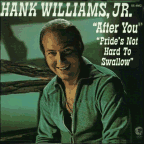 Hank Williams, Jr. "After You/Pride's Not Hard To Swallow" (MGM Records, 1973) (LP)
Hank Williams, Jr. "After You/Pride's Not Hard To Swallow" (MGM Records, 1973) (LP)
As mentioned above, Jr.'s work on the MGM label is not typically thought that highly of, but as this late-vintage release demonstrates, there were certainly some real gems to be found among those old albums. The opening track, "After You," is one hell of a fine hard-country performance, with throaty, heartfelt vocals, stuff as fine as anything Waylon Jennings had to offer at the time. Then he slips into less inspired stuff, with mannered vocals, full of tricks he'd learned years before and didn't have to try too hard to do again. But just when you think he's slipping into a rut, Williams pulls out another plum, a song such as the suggestive "She Went A Bit Farther," in which our hero bluntly tells some gal he's going to drop her because he's found someone who's more adventurous in bed, or "Pride's Not Hard To Swallow," which is another fine self-pity song. He covers an old Lefty tune ("I Love You A Thousand Ways"), and sings about country music in general (no teary tributes to dad on this one, though...) and ends things up with a rather disturbing, somewhat out of place recitation about the dangers of getting busted for statutory rape ("Knoxville Courthouse Blues"), which I guess fits into the whole outlaw persona, but in kind of an unexpected, icky way. Still, this album's a lot stronger than you might imagine, and is well worth checking out.
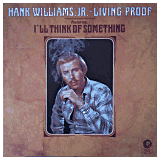 Hank Williams, Jr. "Living Proof" (MGM Records, 1974) (LP)
Hank Williams, Jr. "Living Proof" (MGM Records, 1974) (LP)
(Produced by Jim Vienneau)
An amazingly, incredibly lethargic and lifeless album... He must have been climbing the walls, rolling his eyes, cursing his fate as they made this one, trapped in the very bowels of countrypolitan Nashville at its most stultifying. The structure of this album is pretty interesting: Side One is mostly cover songs, and it's unbelievably sluggish and static, with the sole exception of one song, "How Long Will You Keep Coming Back To Me," which shows a glimmer of life. Then on Side Two, it's all Hank, Jr. originals and although the band keeps dragging its ass, he manages to pull them kicking and screaming into something vaguely approximating actual twang. The last two tracks are a pair of depressingly sleazy cheating songs that finally redeem the record: "Where She Left Off" and "She Was Just Something To Do." It's pretty easy to hear the tensions here between a bad-boy artist who wants to go outlaw and the staid record label execs who want to keep him in his place, and cast him adrift in the studio when he rebels. At least that's the drama I imagine behind the scenes... Or maybe everybody was just going through the motions, like on a zillion other country records of the era. Anyway, there's a sprinkling of okay stuff on here, but nothing to get all worked up about.
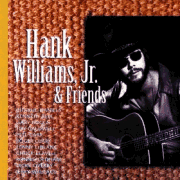 Hank Williams, Jr. "...And Friends" (MGM Records, 1975)
Hank Williams, Jr. "...And Friends" (MGM Records, 1975)
A declaration of independence which came at the tail end of Hank, Jr.'s admittedly mediocre countrypolitan folk-country years... This has some slightly strained production, but it's a mostly solid, memorable set, recorded with the help of fiddler Charlie Daniels and several key members of the early '70s Southern rock scene. The boozer ballads "Stoned At The Jukebox" and "Living Proof" point the way to his self-mythologizing rowdy redneck persona, and though they are unquestionably the best songs on here, there's also a feeling of something lost when he abandoned the earnest singing of folk-country balladeering in favor of a neo-Southern rock redneck image -- the softer style may have been foisted upon him by various record execs, but he was also kinda good at it. Speaking of southern rock, Junior also covers a couple of Marshall Tucker Band tunes, here, "Losin' You" and "Can't You See," both written by the late Toy Talmadge Caldwell... The album's obligatory tribute to Daddy comes at the very end, on "Livin' Proof," which is one of the better entries in this category. No silly political ramblings, though.
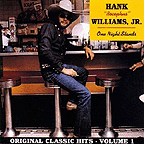 Hank Williams, Jr. "One Night Stands" (Curb/Elektra Records, 1977)
Hank Williams, Jr. "One Night Stands" (Curb/Elektra Records, 1977)
His first album released after a mountain climbing accident that sidelined his career in '75. It's a transitional record, with Jr. edging out of the limp pop-country of his MGM years and into something more vigorous and -- dare I say it -- rowdy. His vocals aren't as robust and balls-out as they'd later become, and several of the up-tempo songs on Side One feature an absurdly perky female chorus that stands out like a sore thumb, and smacks of Nashville-y interference. Midway through, though, Willams lays down some smouldering ballads, such as "Building Memories" and "Honey Won't You Call Me" that let you know this fella's got the goods and is just waiting to cut loose. In a way, it's nice to hear him in a restrained mode; his later work would become too constrained by his goofy redneck image. Scary but true: he covers Eric Carmen's "All By Myself." And then, of course, there's the obligatory Hank, Sr. tribute, "Daddy (I Need You Tonight)," just one on a lo-o-o-ong line of tunes where he continues to milk the old family name...
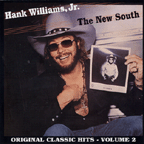 Hank Williams, Jr. "The New South" (Curb/Elektra Records, 1977)
Hank Williams, Jr. "The New South" (Curb/Elektra Records, 1977)
Well, here Jr. is starting to find his feet as an "outlaw" singer... Sounds an awful lot like Waylon (even covering Waylon's "Storms Never Last," and getting ol' Hoss to produce the record...) but he's definitely starting to sculpt his own mythology, and the nods towards the South are gonna be a big part of that image. A lot of these tunes are kind of clumsily or lethargically delivered, and you can kinda see why there weren't any hits here. Includes a southern rock cover of Hank Sr.'s "You're Gonna Change." Honestly, this one's kind of a snoozer. The title track, though, is kind of an interesting sketch of the American South in the 'Seventies, replete with good-natured, unreflective sexism, references to Jimmy Carter and gettin' drunk at football games. Again, the song is kinda sluggish, but its content is worth noting.
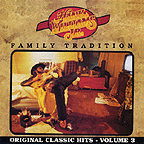 Hank Williams, Jr. "Family Tradition" (Curb/Elektra Records, 1979)
Hank Williams, Jr. "Family Tradition" (Curb/Elektra Records, 1979)
Alright... finally!! Things start to fall in place here, with the killer title tune (Jr.'s best song ever, by far) and the similarly dissolute "I Just Ain't Been Able," which has a pleasantly Waylonesque vibe. His political streak starts to emerge as well, first on the mellow, peace'n'lovey "We Can Work It All Out," and then on "I've Got Rights," a pro-gun tune apparently inspired by the movie "Taxi Driver," or maybe "Magnum Force," which is probably more typical of Jr.'s social leanings. There's still some sluggishness, but man, with two true classics, this disc is well worth it.
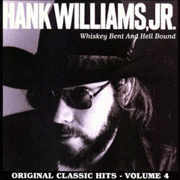 Hank Williams, Jr. "Whiskey Bent And Hell Bound" (Curb/Elektra Records, 1979)
Hank Williams, Jr. "Whiskey Bent And Hell Bound" (Curb/Elektra Records, 1979)
A classic. This is where his outlaw persona really fell into place -- the songs, all but three of which were written by Williams himself, are all pretty solid, and several, such as "O.D.'d In Denver," "(I Don't Have) Anymore Love Songs" and the title track (naturally) are highwater marks of the genre. There are even some surprises on the rockin' end of the genre -- a cover of "White Lightnin' " is only so-so, but Junior 's reserved acoustic version of Greg Allman's "Come And Go Blues" is a real head turner. Even the obligatory Hank, Sr. tribute is of unusually high calibre: "The Conversation" is a swell duet with Waylon Jennings, where Waylon inquires if all those old stories were true... You might credit this album's success to producer Jimmy Bowen's steady hand at the wheel, but really, this is where Hank Jr. came into his own -- earlier albums have their gems, but this disc holds its own from start to finish. Recommended!
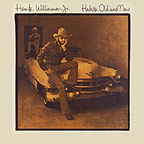 Hank Williams, Jr. "Habits Old And New" (Curb/Elektra Records, 1980)
Hank Williams, Jr. "Habits Old And New" (Curb/Elektra Records, 1980)
This disc starts off on a high note, with the title track, "Old Habits," one of Junior's best, but the next track, "Dinosaur," in which he crabs about glam rock (and does a little bit of gay bashing along the way...) is a downer, as is his disco-tinged remake of "Kaw-Liga." The rest of the album is kinda low-key, not bad, but not with a whole lotta catchy tunes. He does do an okay cover of Kris Kristofferson's "If You Don't Hank Williams," though it's sort of unfortunate that this is the version of this songs that most country fans probably know... Unfortunate because Kristofferson's version is much livelier and more heartfelt, and also because the thought of Hank's son singing this tune sort of undercuts its credibility. Anyway, this is an okay album, but not great.
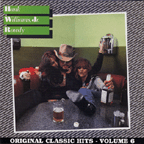 Hank Williams, Jr. "Rowdy" (Curb/Elektra Records, 1981)
Hank Williams, Jr. "Rowdy" (Curb/Elektra Records, 1981)
A fairly solid album. The production is punchy, the songs are fairly coherent, and some are kinda striking. Obligatory daddy tribute: Waylon's "Are You Sure Hank Done It This Way," which has the same shortcomings as the Kristofferson tune discussed above. On the other hand, his cover of poppa's old hit, "Ramblin' Man," is one of his best Hank, Sr. covers ever (except for the saxophone solo at the end...) Politics are covered in "Give A Damn," wherein he urges American laborers to take pride in their work, and Junior name checks himself on "Footlights," which is okay, but an indication of how tedious this whole reflections-on-fame thing can get. Other than "Texas Women," the most striking tune may be "You Can't Find Many Kissers," in which he laments the overabundance of wham-bam-thank-ya-man swinger gals, and the lack of romance in their hearts (Uh, yeah... right.) Anyway, this album's okay, but not great.
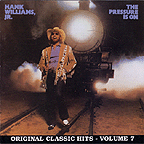 Hank Williams, Jr. "The Pressure Is On" (Curb Records, 1981)
Hank Williams, Jr. "The Pressure Is On" (Curb Records, 1981)
Another mixed bag. The hits are "A Country Boy Can Survive" and "All My Rowdy Friends (Have Settled Down)"; the political tune is the Jerry Reed-like "Coalition to Ban Coalitions," and the surprise highlight is a duet with George Jones, "I Don't Care (If Tomorrow Never Comes)." This time around the obligatory Daddy song is actually kind of a gem, "Ballad Of Hank," a rapid-clip half-spoken duet with an old bandmember who recounts Hank, Sr.'s wild mismanagement of his entourage... It's not the kinda tune you'd hum on the way home, but it's an interesting slice of Hank-iania. Junior's crooning is pretty weak overall, though, on this album, and the low points are pretty low, notably the sluggish closers, "Weatherman" and "Everytime I Hear That Song." Still... it has its moments.
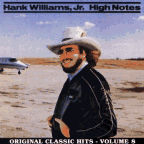 Hank Williams, Jr. "High Notes" (Curb Records, 1982)
Hank Williams, Jr. "High Notes" (Curb Records, 1982)
He sounds just plain tired on this one -- uninspired, burnt out, and musically unfocussed. Junior travels down familiar paths -- drinkin', druggin', livin' hard and waitin' for the South to rise againÉ But there's so little conviction in the delivery that you really can't take anything seriously on this disc. Includes a trio of terrible covers at the end of Side Two - a lifeless version of The Ozark Mountain Daredevils' "If You Wanna Get To Heaven," a quaaluded rendition of "Norwegian Wood," a pointless, rinkydink run-through of Daddy's "Honky Tonkin'." Depressing, really.
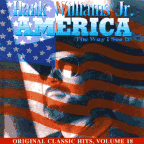 Hank Williams, Jr. "America (The Way I See It)" (Curb Records, 1990)
Hank Williams, Jr. "America (The Way I See It)" (Curb Records, 1990)
Jr's big political, populist album -- Bubbanomics 101. With songs like "Don't Give Us A Reason," "USA Today" and "Coalition to Ban Coalitions," this set is somewhat funny in a campy, novelty-song kinda way, but for the most part, these just aren't very well-written songs. Plus, it's a bit ironic to hear a notoriously "rowdy" party animal lecturing the rest of us about the need for moral reform in America today. Unless he's gonna go off and get religion, Jr. might just want to stick to drinking songs for the time being. "A Country Boy Can Survive" and "All My Rowdy Friends" are the highlights...
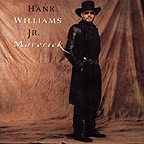 Hank Williams, Jr. "Maverick" (Curb/Capricorn Records, 1992)
Hank Williams, Jr. "Maverick" (Curb/Capricorn Records, 1992)
Er, um... Dang. He's obviously trying to make things cook, but the soup's still pretty thin. The opening track, "Come On Over To The Country" -- a Hank Junior original in which he taunts rock fans who are ashamed to admit they really like country -- is embarrassingly clumsy. The good news is, after such a weak opening there's really nowhere to go but up, as evidenced by "Lyin' Jukebox," an almost-great barroom ballad that seems to summon Williams's old spirit. But jeez, does this album slide downhill after that, with a cluster of clunkers that makes you just shake your head and wonder, "Why?? Includes more warmed-over Southern rock and bar-band blues... with little creative spark in sight. The obligatory "daddy" song is a duet with Clint Black called "Hotel Whiskey," wherein Junior recounts life on the road -- it cracked into the middle of the Top 100, but it still ain't nothin' new. "Fax Me A Beer" is a great song title, but a crappy tune. Oh, well. Whatever.
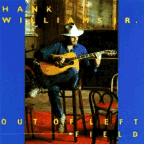 Hank Williams, Jr. "Out Of Left Field" (Curb/Capricorn Records, 1993)
Hank Williams, Jr. "Out Of Left Field" (Curb/Capricorn Records, 1993)
(Produced by Barry Beckett & James Stroud)
This disc starts out relatively restrained, and you might think, well his vocals ain't that great, but the tunes are okay. That warm, fuzzy feeling slowly dissippates over the course of the record: H2 inevitably slips into his same old, same old, grumbling and grousing about everything under the sun and swearing a little bit, just to make sure we know how "real" he can be. Whatever. I mean, this album has some okay stuff on it, but with all the really, really great country music out there in the world, why settle for "okay?" On the other hand, this seems to be the only Hank, Jr. album (that I know of, at least) in which he doesn't name-check his daddy... So, gosh, I guess he is capable of change!
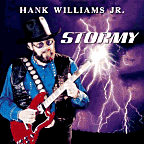 Hank Williams, Jr. "Stormy" (Curb Records, 1999)
Hank Williams, Jr. "Stormy" (Curb Records, 1999)
Well, sometimes, Hank Jr. just kinda sounds like a kook. Or an annoying drunk, a comparison I'm sure he'd welcome, as heard on the foul-mouthed barroom brawler, "I'd Like To Knock The Hell Out Of You," which is, sadly, perhaps the highlight of this fairly dismal album. "Where Would We Be Without Yankees" is a crypto Jew-bashing tune (in which he sings about how "they" run the media...) Other songs, such as "Naked Women And Beer," offer little relief, or little in the way of good music. Really, this disc is pretty depressing, so poorly constructed and so charged with blind anger and antagonism that it can almost reach you in a so-bad-its-good kinda way. Mostly it's just an embarrassment. Daddy song: "Southern Thunder." Also includes a tribute to TV cartoon character Hank Hill, of the show King Of The Hill.
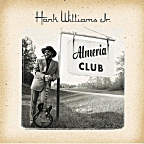 Hank Williams, Jr. "The Almeria Club" (Curb/Atlantic Records, 2002)
Hank Williams, Jr. "The Almeria Club" (Curb/Atlantic Records, 2002)
(Produced by Chuck Howard & Hank Williams, Jr.)
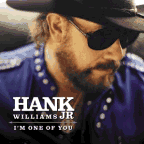 Hank Williams, Jr. "I'm One Of You" (Curb Records, 2003)
Hank Williams, Jr. "I'm One Of You" (Curb Records, 2003)
(Produced by Doug Johnson & Hank Williams, Jr.)
Musically speaking, this is well produced and well-performed -- heck, even his vocals are pretty good. But the material... yeesh. "(It Takes A Whole Lot Of) Liquor To Like Her" is almost really funny, but its tongue-in-cheek misogyny is just a little too sincere, even if Junior delivers the lines with a knowing, self-deprecating wink and a nod. Political populism is represented on the title track (it's okay...), name-dropping is covered on "Waylon's Guitar," and ill-advised cover tunes include "Games People Play" and Jerry Reed's "Amos Moses." Well, in the final analysis, this one ain't so bad... That is, he's done lots worse before. For Junior, this is a good one.
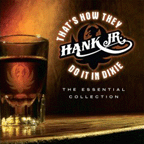 Hank Williams, Jr. "That's How They Do It In Dixie: The Essential Collection" (Curb Records, 2006)
Hank Williams, Jr. "That's How They Do It In Dixie: The Essential Collection" (Curb Records, 2006)
A new best-of set, with a kickass new single and another new politcal tune. Turns out, when you really pare things down, Junior's got some fun stuff to come back to... At least I still can't keep myself from singing along every time I hear "Family Tradition..." This barebones retrospective is a compact, tight reading of his career, from the killer outlaw country to the chunky, clunky redneck rock... The most striking thing on here is the strength of his new single, "That's How They Do It In Dixie," a rompy-stompy southern rocker with a catchy chorus and guest appearances from Gretchen Wilson, Van Zant and Big & Rich. The other new song, "Stirrin' It Up," is a standard-issue Hank, Jr. political tune -- always a challenge for the uninitiated. But all in all, this is a decent collection. There are some songs I wish he'd put on here rather than others, but hey, you get what you get when H2 puts out a record. Nice to hear the new stuff is so good!
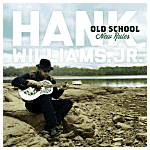 Hank Williams, Jr. "Old School New Rules" (Warner/Bocephus Records, 2012)
Hank Williams, Jr. "Old School New Rules" (Warner/Bocephus Records, 2012)
Hank's boy Bocephus is back to his same old tricks -- patriotic chest-thumping, pointless liberal bashing, reminding us who his dad was, celebrating mythical booze binges, etc. Nothing new, though he's still got that unique Hank Jr. charisma. Brad Paisley sings a duet (on the Hank, Sr. tribute, "I'm Gonna Get Drunk And Play Hank Williams") while H2's fellow country curmudgeon Merle Haggard drops by for a version of "I Think I'll Just Stay Here And Drink." Those are album highlights; tunes like "The Cow Turd Blues," a little less so.
 Hank Williams, Jr. "It's About Time" (Icon Records, 2016)
Hank Williams, Jr. "It's About Time" (Icon Records, 2016)
Other Media
"Living Proof: An Autobiography"
by Hank Williams, Jr.
(Putnam Books, 1979)
Hank, Jr.'s autobiography, written at the peak of his artistic and commercial success, but with just enough perspective on his personal tragedies -- two failed marriages, notable substance abuse, his 1975 hiking accident, and a continuing, continual artistic crisis of conscience -- to make this a pretty spicy read.
Links


Hick Music Index

 Hank Williams, Jr. "Living Proof -- The MGM Recordings: 1963-1975" (Polygram Records, 1994)
Hank Williams, Jr. "Living Proof -- The MGM Recordings: 1963-1975" (Polygram Records, 1994)

 Hank Williams, Jr. "The Bocephus Box: 1979-1992" (Curb Records, 1992)
Hank Williams, Jr. "The Bocephus Box: 1979-1992" (Curb Records, 1992)
 Hank Williams, Jr. "The Complete Hank Williams, Jr." (Curb Records, 1999)
Hank Williams, Jr. "The Complete Hank Williams, Jr." (Curb Records, 1999)
 Hank Williams, Jr. & Lois Johnson "Removing The Shadow" (MGM Records, 1970) (LP)
Hank Williams, Jr. & Lois Johnson "Removing The Shadow" (MGM Records, 1970) (LP)
 Hank Williams, Jr. "After You/Pride's Not Hard To Swallow" (MGM Records, 1973) (LP)
Hank Williams, Jr. "After You/Pride's Not Hard To Swallow" (MGM Records, 1973) (LP)
 Hank Williams, Jr. "Living Proof" (MGM Records, 1974) (LP)
Hank Williams, Jr. "Living Proof" (MGM Records, 1974) (LP)
 Hank Williams, Jr. "...And Friends" (MGM Records, 1975)
Hank Williams, Jr. "...And Friends" (MGM Records, 1975)
 Hank Williams, Jr. "One Night Stands" (Curb/Elektra Records, 1977)
Hank Williams, Jr. "One Night Stands" (Curb/Elektra Records, 1977)
 Hank Williams, Jr. "The New South" (Curb/Elektra Records, 1977)
Hank Williams, Jr. "The New South" (Curb/Elektra Records, 1977)
 Hank Williams, Jr. "Family Tradition" (Curb/Elektra Records, 1979)
Hank Williams, Jr. "Family Tradition" (Curb/Elektra Records, 1979)
 Hank Williams, Jr. "Whiskey Bent And Hell Bound" (Curb/Elektra Records, 1979)
Hank Williams, Jr. "Whiskey Bent And Hell Bound" (Curb/Elektra Records, 1979)
 Hank Williams, Jr. "Habits Old And New" (Curb/Elektra Records, 1980)
Hank Williams, Jr. "Habits Old And New" (Curb/Elektra Records, 1980)
 Hank Williams, Jr. "Rowdy" (Curb/Elektra Records, 1981)
Hank Williams, Jr. "Rowdy" (Curb/Elektra Records, 1981)
 Hank Williams, Jr. "The Pressure Is On" (Curb Records, 1981)
Hank Williams, Jr. "The Pressure Is On" (Curb Records, 1981)
 Hank Williams, Jr. "High Notes" (Curb Records, 1982)
Hank Williams, Jr. "High Notes" (Curb Records, 1982)
 Hank Williams, Jr. "America (The Way I See It)" (Curb Records, 1990)
Hank Williams, Jr. "America (The Way I See It)" (Curb Records, 1990)
 Hank Williams, Jr. "Maverick" (Curb/Capricorn Records, 1992)
Hank Williams, Jr. "Maverick" (Curb/Capricorn Records, 1992)
 Hank Williams, Jr. "Out Of Left Field" (Curb/Capricorn Records, 1993)
Hank Williams, Jr. "Out Of Left Field" (Curb/Capricorn Records, 1993)
 Hank Williams, Jr. "Stormy" (Curb Records, 1999)
Hank Williams, Jr. "Stormy" (Curb Records, 1999)
 Hank Williams, Jr. "The Almeria Club" (Curb/Atlantic Records, 2002)
Hank Williams, Jr. "The Almeria Club" (Curb/Atlantic Records, 2002)
 Hank Williams, Jr. "I'm One Of You" (Curb Records, 2003)
Hank Williams, Jr. "I'm One Of You" (Curb Records, 2003)
 Hank Williams, Jr. "That's How They Do It In Dixie: The Essential Collection" (Curb Records, 2006)
Hank Williams, Jr. "That's How They Do It In Dixie: The Essential Collection" (Curb Records, 2006)
 Hank Williams, Jr. "Old School New Rules" (Warner/Bocephus Records, 2012)
Hank Williams, Jr. "Old School New Rules" (Warner/Bocephus Records, 2012)


